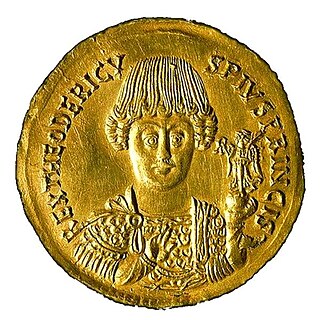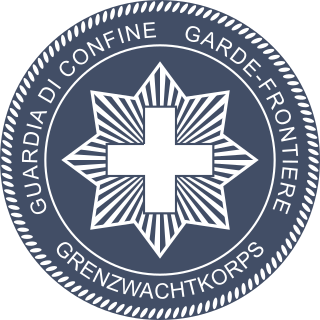Related Research Articles

Romulus Augustus, commonly known by the nickname Augustulus, was Roman emperor of the West from 31 October 475 until 4 September 476. Romulus was placed on the imperial throne by his father, the magister militum Orestes, and, at that time still a minor, was little more than a figurehead for his father. After Romulus ruled for just ten months, the barbarian general Odoacer defeated and killed Orestes and deposed Romulus. As Odoacer did not proclaim any successor, Romulus is typically regarded as the last western Roman emperor, his deposition marking the end of the Western Roman Empire as a political entity. The deposition of Romulus Augustulus is also sometimes used by historians to mark the transition from antiquity to the medieval period.

Glycerius was Roman emperor of the West from 473 to 474. He served as comes domesticorum during the reign of Olybrius, until Olybrius died in November 472. After a four-month interregnum, Glycerius was proclaimed Western Emperor in March 473 by the magister militum and power behind the throne Gundobad. Very few of the events of his reign are known other than that during his reign an attempted invasion of Italy by the Visigoths was repelled, diverting them to Gaul. Glycerius also prevented an invasion by the Ostrogoths through gifts.

Julius Nepos, also known as just Nepos, ruled as Roman emperor of the West from 24 June 474 to 28 August 475. After losing power in Italy, Nepos retreated to his home province of Dalmatia, from which he continued to claim the western imperial title, with recognition from the Eastern Roman Empire, until he was murdered in 480. Though that distinction is most often awarded to Nepos' successor in Italy, Romulus Augustulus, Nepos is regarded by some historians as the last western Roman emperor, being the last widely recognised claimant to the position.
A tariff is a tax imposed by a government of a country or of a supranational union on imports or exports of goods. Besides being a source of revenue for the government, import duties can also be a form of regulation of foreign trade and policy that taxes foreign products to encourage or safeguard domestic industry. Tariffs are among the most widely used instruments of protectionism, along with import and export quotas.

Customs is an authority or agency in a country responsible for collecting tariffs and for controlling the flow of goods, including animals, transports, personal effects, and hazardous items, into and out of a country. Traditionally, customs has been considered as the fiscal subject that charges customs duties and other taxes on import and export. In recent decades, the views on the functions of customs have considerably expanded and now covers three basic issues: taxation, security, and trade facilitation.
The Incoterms or International Commercial Terms are a series of pre-defined commercial terms published by the International Chamber of Commerce (ICC) relating to international commercial law. They are widely used in international commercial transactions or procurement processes and their use is encouraged by trade councils, courts and international lawyers. A series of three-letter trade terms related to common contractual sales practices, the Incoterms rules are intended primarily to clearly communicate the tasks, costs, and risks associated with the global or international transportation and delivery of goods. Incoterms inform sales contracts defining respective obligations, costs, and risks involved in the delivery of goods from the seller to the buyer, but they do not themselves conclude a contract, determine the price payable, currency or credit terms, govern contract law or define where title to goods transfers.
Free economic zones (FEZ), free economic territories (FETs) or free zones (FZ) are a class of special economic zone (SEZ) designated by the trade and commerce administrations of various countries. The term is used to designate areas in which companies are taxed very lightly or not at all to encourage economic activity. The taxation rules and duties are determined by each country. The World Trade Organization (WTO) Agreement on Subsidies and Countervailing Measures (SCM) has content on the conditions and benefits of free zones.

The Western Roman Empire comprises the western provinces of the Roman Empire at any time during which they were administered by a separate independent Imperial court; in particular, this term is used in historiography to describe the period from 395 to 476, where there were separate coequal courts dividing the governance of the empire in the Western and the Eastern provinces, with a distinct imperial succession in the separate courts. The terms Western Roman Empire and Eastern Roman Empire were coined in modern times to describe political entities that were de facto independent; contemporary Romans did not consider the Empire to have been split into two empires but viewed it as a single polity governed by two imperial courts as an administrative expediency. The Western Roman Empire collapsed in 476, and the Western imperial court in Ravenna was formally dissolved by Justinian in 554. The Eastern imperial court survived until 1453.

The Townshend Acts or Townshend Duties, refers to a series of British acts of Parliament passed during 1767 and 1768 relating to the British colonies in America. They are named after Charles Townshend, the Chancellor of the Exchequer who proposed the program. Historians vary slightly as to which acts they include under the heading "Townshend Acts", but five are often listed:

The New Zealand Customs Service is a state sector organisation in New Zealand whose role is to provide border control and protect the community from potential risks arising from international trade and travel, as well as collecting duties and taxes on imports to the country.

The Ostrogothic Kingdom, officially the Kingdom of Italy, was established by the Germanic Ostrogoths in Italy and neighboring areas from 493 to 553.

A border guard of a country is a national security agency that performs border security. Some of the national border guard agencies also perform coast guard and rescue service duties.

HM Customs was the national Customs service of England until a merger with the Department of Excise in 1909. The phrase 'HM Customs', in use since the Middle Ages, referred both to the customs dues themselves and to the office of state established for their collection, assessment and administration.
An inheritance tax is a tax paid by a person who inherits money or property of a person who has died, whereas an estate tax is a levy on the estate of a person who has died.
Quintus Caecilius Metellus Nepos was a son of Quintus Caecilius Metellus Nepos. He was a tribune of the plebs in 62 BC, a praetor in 60 BC, a consul in 57 BC and the governor of Hispania Citerior in 56 BC.

The Swiss Border Guard was a federal law enforcement agency, which acted as both the border guard and customs service for Switzerland. It was a uniformed and armed section of the Federal Customs Administration, which is attached to the Federal Department of Finance. It was the largest civilian security agency on a federal level. Its members were subjected to military criminal law.

The Royal Malaysian Customs Department, abbreviated RMC or JKDM, is the Malaysian Government agency responsible for administrating the nation's indirect tax policy, border enforcement and narcotic offences. In other words, KDRM administers seven (7) main and thirty-nine (39) subsidiary laws. Apart from this, KDRM implements 18 by-laws for other government agencies. KDRM is now known as JKDM when Ibrahim Jaapar took over as the leader of the department in 2009.

Pakistan Customs is one of the elite cadres of the Civil Services of Pakistan. It is serving as the guardian of Pakistan's borders against movement of contraband goods and encourage bona-fide trade. It provided a major source of revenue to the Government of Pakistan in the form of taxes levied. It also helps to protect the domestic industry and stimulates the trade.
Taxation in Norway is levied by the central government, the county municipality and the municipality. In 2012 the total tax revenue was 42.2% of the gross domestic product (GDP). Many direct and indirect taxes exist. The most important taxes – in terms of revenue – are VAT, income tax in the petroleum sector, employers' social security contributions and tax on "ordinary income" for persons. Most direct taxes are collected by the Norwegian Tax Administration and most indirect taxes are collected by the Norwegian Customs and Excise Authorities.

The Eastern Roman Empire was ruled by the House of Leo from AD 457, the accession of Leo I, to 518, the death of Anastasius I. The rule of the Leonid dynasty coincided with the rapid decline, collapse and eventual fall of the Western Roman Empire. Following the end of the Western Empire, Emperor Zeno abolished the position of Western Roman Emperor and declared himself the sole Roman Emperor. The Eastern Roman Empire would come to last for several more centuries, and subsequent dynasties would invest large amounts of resources in attempts to retake the western provinces.
References
- ↑ Williamson, Callie (24 February 2010). The Laws of the Roman People: Public Law in the Expansion and Decline of the Roman Republic. University of Michigan Press. ISBN 978-0472025428.
- ↑ Nicali, Antonio. "A Historical Outlook on the Italian Customs Policy".
- ↑ Cassius Dio, Roman History, 37.51.3-4
- ↑ "LacusCurtius • Customs Duties in Roman Times (Smith's Dictionary, 1875)". penelope.uchicago.edu.